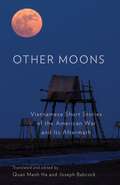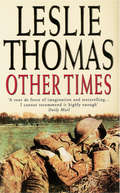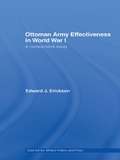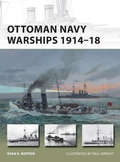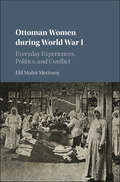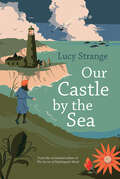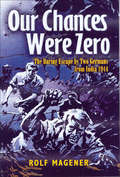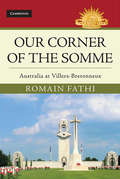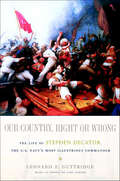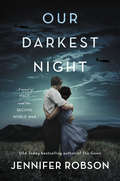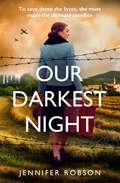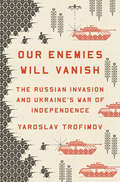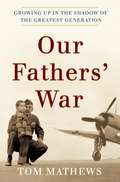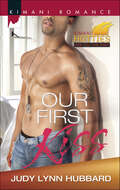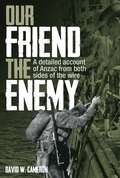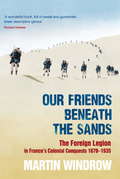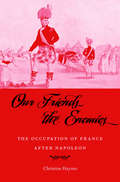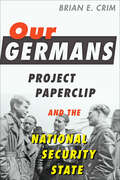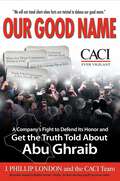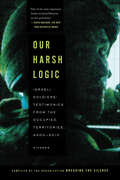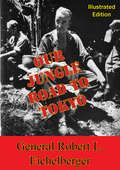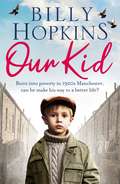- Table View
- List View
Other Moons: Vietnamese Short Stories of the American War and Its Aftermath
by Quan Manh Ha and Joseph BabcockIn this anthology, Vietnamese writers describe their experience of what they call the American War and its lasting legacy through the lens of their own vital artistic visions. A North Vietnamese soldier forms a bond with an abandoned puppy. Cousins find their lives upended by the revelation that their fathers fought on opposite sides of the war. Two lonely veterans in Hanoi meet years after the war has ended through a newspaper dating service. A psychic assists the search for the body of a long-vanished soldier. The father of a girl suffering from dioxin poisoning struggles with corrupt local officials.The twenty short stories collected in Other Moons range from the intensely personal to narratives that deal with larger questions of remembrance, trauma, and healing. By a diverse set of authors, including many veterans, they span styles from social realism to tales of the fantastic. Yet whether describing the effects of Agent Orange exposure or telling ghost stories, all speak to the unresolved legacy of a conflict that still haunts Vietnam. Among the most widely anthologized and popular pieces of short fiction about the war in Vietnam, these works appear here for the first time in English. Other Moons offers Anglophone audiences an unparalleled opportunity to experience how the Vietnamese think and write about the conflict that consumed their country from 1954 to 1975—a perspective still largely missing from American narratives.
Other Times
by Leslie ThomasAt the start of the war in 1939 James Bevan is a junior officer approaching middle-age, attached to a small anti-aircraft unit on the south coast.Abandoned by his wife, the soldiers he command are his family: Bairnsfather, whose sexual encounters with his girl friend Muriel take place in an air-raid shelter; Cartwright, trying to keep two women on his gunner's pay of a shilling a day; Hignet, cosily educating himself in the orderly room. It is a rude awakening when they are called upon for the real war.Hugely absorbing, rich and rewarding, Other Times brims with history and experience, love, sorrow and humour.
Otterburn 1388
by Stephen Walsh Peter ArmstrongIn his Chronicles, Froissart describes Otterburn as 'the best fought and the most severe' battle of his time. Fought at Redesdale in Northumberland in August 1388, the battle originated from the ongoing war between the Scots and the English following Robert Bruce's victory over the English at Bannockburn in 1314. Using all the contemporary sources, this book details the events that led up to the clash on the borders, examines the opposing armies, their weaponry and their commanders - including the Douglases on the Scots side and the Percys on the English - and gives a full account of the battle and its aftermath.
Ottoman Army Effectiveness in World War I: A Comparative Study (Military History And Policy Ser.)
by Edward J. EricksonThis volume examines how the Ottoman Army was able to evolve and maintain a high level of overall combat effectiveness despite the primitive nature of the Ottoman State during the First World War. Structured around four case studies, at the operational and tactical level, of campaigns involving the Ottoman Empire and the British Empire: Gallipoli i
Ottoman Navy Warships 1914-18
by Paul Wright Ryan NoppenAt the start of the 20th century the Ottoman Navy was a shadow of its former might, a reflection of the empire as a whole - the "Sick Man of Europe". Years of defeat, nepotism, and neglect had left the Ottoman Navy with a mix of obsolete vessels, whilst the list of prospective enemies was ever-growing. An increasing Russian naval presence in the Black Sea and the alarming emergence of Italy and Greece as regional Naval powers proved beyond all doubt that intensive modernization was essential, indeed, the fate of the Empire as a naval power depended on it. So the Ottoman Navy looked to the ultimate naval weapon of the age, the dreadnought battleship, two of which were ordered from the British with extreme alacrity. But politics intervened, and a succession of events culminated in the Ottoman Navy fielding a modern German battlecruiser and state-of-the-art light cruiser instead - with dramatic consequences. In this meticulous study, Ryan Noppen presents a fresh appraisal of the technical aspects and operations of the warships of the Ottoman Navy in World War I. It is the first work of its kind in the English language - produced with a wealth of rare material with the cooperation of the Turkish Consulate and Navy. Packed with precise technical specifications, revealing illustrations and exhaustive research, this is an essential guide to a crucial chapter in the Aegean arms raceFrom the Trade Paperback edition.
Ottoman Women during World War I: Everyday Experiences, Politics, and Conflict
by Metinsoy Elif MahirDuring war time, the everyday experiences of ordinary people - and especially women - are frequently obscured by elite military and social analysis. In this pioneering study, Elif Mahir Metinsoy focuses on the lives of ordinary Muslim women living in the Ottoman Empire during the First World War. It reveals not only their wartime problems, but also those of everyday life on the Ottoman home front. It questions the existing literature's excessive focus on the Ottoman middle-class, using new archive sources such as women's petitions to extend the scope of Ottoman-Turkish women's history. Free from academic jargon, and supported by original illustrations and maps, it will appeal to researchers of gender history, Middle Eastern and social history. By showing women's resistance to war mobilization, wartime work life and the everyday struggles which shaped state politics, Mahir Metinsoy allows readers to draw intriguing comparisons between the past and the current events of today's Middle East.
Our Castle by the Sea
by Lucy StrangeIn this haunting and compelling follow-up to The Secret of Nightingale Wood, Lucy Strange takes a seafaring myth and grounds it in the stark reality of World War II.Growing up in a lighthouse, 11-year-old Pet's world has been one of storms, secret tunnels, and stories about sea monsters. But now the country is at war and the cliff tops are a terrifying battleground. Pet will need to muster all her bravery to uncover why her family is being torn apart. This is the story of a girl who is afraid and unnoticed. A girl who freezes with fear at the enemy planes ripping through the skies overheard. A girl who is somehow destined to become part of the strange, ancient legend of the Daughters of Stone.
Our Chances were Zero: The Daring Escape by two German POW's from India in 1942
by Rolf MagenerDuring World War II the British imprisoned many German and Italian prisoners of war and civilian internees in India. The less co-operative prisoners were kept under harsh conditions in camps in the Himalayan foothills. The author was a German civilian working in India at the outbreak of war and was promptly interned by the British. In 1942 Magener and another prisoner, Heins von Have, finally managed to escape. Getting out of the camp was only the prelude to the difficult task of making their way across the entire Indian sub-continent in an attempt to reach friendly territory. Disguising themselves as British officers, the two Germans made an epic journey across India and through British forces on the Burma frontier in an attempt to link up with advancing Japanese forces. Ironically, the Japanese unit they finally located did not believe their story and they came close to being executed as spies.His grippingly told personal narrative of a German's escape from Allied custody is unique in the annals of prisoner-of-war escape and evasion.
Our Corner of the Somme: Australia at Villers-Bretonneux (Australian Army History Series)
by Romain FathiBy the time of the Armstice, Villers-Bretonneux - once a lively and flourishing French town - had been largely destroyed, and half its population had fled or died. From March to August 1918, Villers-Bretonneux formed part of an active front line, at which Australian troops were heavily involved. As a result, it holds a significant place in Australian history. Villers-Bretonneux has since become an open-air memorial to Australia's participation in the First World War. Successive Australian governments have valourised the Australian engagement, contributing to an evolving Anzac narrative that has become entrenched in Australia's national identity. Our Corner of the Somme provides an eye-opening analysis of the memorialisation of Australia's role on the Western Front and the Anzac mythology that so heavily contributes to Australians' understanding of themselves. In this rigorous and richly detailed study, Romain Fathi challenges accepted historiography by examining the assembly, projection and performance of Australia's national identity in northern France.
Our Country, Right or Wrong: The Life of Stephen Decatur, the U.S. Navy's Most Illustrious Commander
by Leonard F. GuttridgeBlazing sea fights and undercurrents of intrigue: these are among the compelling ingredients of a biography that brings to life the most illustrious and formidable figure of the United States Navy. His name is carried by more than two dozen towns and cities. Here at last is a full exploration of Stephen Decatur's complex character. Reckless in youth, cool yet audacious in combat, loved by those who sailed under his command yet plotted against by rivals in the race for glory, Decatur is brought to life in this enthralling sea story.Decatur's heroism became widespread news in 1804 when, sent to reclaim a captured U.S. vessel from Tripoli in the Barbary Wars, he ordered his men to set fire to the captured vessel and proceed to attack the sailors of the Tripoli fleet in hand-to-hand combat. His brilliance continued through the War of 1812, after which he was promoted to the highest naval rank of Commodore. Decatur not only proved dauntless on the quarterdeck but amazingly effective in Mediterranean diplomacy. His spectacular dealings with Islamic powers presaged America's twenty-first century involvement in the region.Readers will also learn the identity of the woman he forsook for a sophisticated beauty pursued by suitors as varied as Napoleon Bonaparte's younger brother and Aaron Burr. Through freshly discovered documents, many official, some intensely personal, biographer Leonard Guttridge traces the elements that sped Decatur inexorably into the shadow of murder. Here, at last, is the full story of the man who raised the most memorable toasts in the history of American celebrations, when he declared in 1816 "Our country! In her intercourse with foreign nations may she always be in the right; but our country, right or wrong!" At the Publisher's request, this title is being sold without Digital Rights Management Software (DRM) applied.
Our Darkest Night: A Novel of Italy and the Second World War
by Jennifer RobsonTo survive the Holocaust, a young Jewish woman must pose as a Christian farmer’s wife in this unforgettable novel from USA Today bestselling author Jennifer Robson—a story of terror, hope, love, and sacrifice, inspired by true events, that vividly evokes the most perilous days of World War II.It is the autumn of 1943, and life is becoming increasingly perilous for Italian Jews like the Mazin family. With Nazi Germany now occupying most of her beloved homeland, and the threat of imprisonment and deportation growing ever more certain, Antonina Mazin has but one hope to survive—to leave Venice and her beloved parents and hide in the countryside with a man she has only just met.Nico Gerardi was studying for the priesthood until circumstances forced him to leave the seminary to run his family’s farm. A moral and just man, he could not stand by when the fascists and Nazis began taking innocent lives. Rather than risk a perilous escape across the mountains, Nina will pose as his new bride. And to keep her safe and protect secrets of his own, Nico and Nina must convince prying eyes they are happily married and in love.But farm life is not easy for a cultured city girl who dreams of becoming a doctor like her father, and Nico’s provincial neighbors are wary of this soft and educated woman they do not know. Even worse, their distrust is shared by a local Nazi official with a vendetta against Nico. The more he learns of Nina, the more his suspicions grow—and with them his determination to exact revenge. As Nina and Nico come to know each other, their feelings deepen, transforming their relationship into much more than a charade. Yet both fear that every passing day brings them closer to being torn apart . . .
Our Darkest Night: Inspired by true events, a powerfully moving story of love and sacrifice in World War Two Italy
by Jennifer RobsonTO SAVE THOSE SHE LOVES, SHE MUST MAKE THE ULTIMATE SACRIFICE.In Our Darkest Night, internationally bestselling author of The Gown, Jennifer Robson, tells an unforgettable story of terror, hope, love, and sacrifice, that vividly evokes the most perilous days of World War II.Inspired by true events. Perfect for readers of The Tattooist of Auschwitz by Heather Morris, The Child on Platform One by Gill Thompson and The Girl I Left Behind by Andie Newton.'A tale of devastating simplicity and poignant sweetness' Kate Quinn 'A powerful, emotional, and unflinching story of love, sacrifice, and resilience' Chanel Cleeton 'Haunting and inspiring, heartbreaking and hopeful, this novel is unforgettable' Kristin Beck Venice, 1943: Under the Nazi occupation, life is increasingly perilous for Italian Jews. Antonina Mazin has but one hope to survive - to leave her beloved parents and hide in the countryside, posing as the bride of a man she has only just met. Nico Gerardi was studying for the priesthood until circumstances forced him to return home to run his family's farm. A moral and just man, he refuses to remain a bystander to Nazi and fascist atrocities. The only way to keep Nina safe - and protect secrets of his own - is to convince prying eyes that their sudden marriage is a love match. But farm life is not easy for a cultured city girl who dreams of becoming a doctor like her father, and Nico's provincial neighbours are wary of this soft, educated stranger. Even worse, their distrust is shared by a local Nazi official with a vendetta against Nico. As Nina and Nico come to know each other, their relationship deepens, transforming into much more than a charade. Yet both fear that every passing day brings them closer to being torn apart...Don't miss Jennifer's enthralling historical novel about one of the most famous wedding dresses of the twentieth century - Queen Elizabeth's wedding gown - and the fascinating women who made it. Perfect for anyone who's captivated by The Crown, The Gown 'will dazzle and delight' (Independent).
Our Enemies Will Vanish: The Russian Invasion and Ukraine's War of Independence
by Yaroslav Trofimov&“Our Enemies Will Vanish achieves the highest level of war reporting: a tough, detailed account that nevertheless reads like a great novel. One is reminded of Michael Herr's Dispatches . . . Frankly, it's what we have all aspired to. I did not really understand Ukraine until I read Trofimov's account.&” —Sebastian JungerA revelatory eyewitness account of Russia&’s invasion of Ukraine and heroism of the Ukrainian people in their resistance by Yaroslav Trofimov, the Ukrainian chief foreign-affairs correspondent for The Wall Street Journal.Since Russia invaded Ukraine in February 2022, Yaroslav Trofimov has spent months on end at the heart of the conflict, very often on its front lines. In this authoritative account, he traces the war&’s decisive moments—from the battle for Kyiv to more recently the gruelling and bloody arm wrestle involving the Wagner group over Bakhmut—to show how Ukraine and its allies have turned the tide against Russia, one of the world&’s great military powers, in a modern-day battle of David and Goliath. Putin had intended to conquer and annex Ukraine with a vicious blitzkrieg, redrawing the map of Europe in a few short weeks with seismic geopolitical consequences. But in the face of this existential threat, the Ukrainian people fought back, turning what looked like certain defeat into a great moral victory, even as the territorial battle continues to seesaw to this day. This is the story of the epic bravery of the Ukrainian people—people Trofimov knows very well.For Trofimov, this war is deeply personal. He grew up in Kyiv and his family has lived there for generations. With deep empathy and local understanding, Trofimov tells the story of how everyday Ukrainian citizens—doctors, computer programmers, businesspeople, and schoolteachers—risked their lives and lost loved ones. He blends their brave and tragic stories with expert military analysis, providing unique insight into the thinking of Ukrainian leadership and mapping out the decisive stages of what has become a perilous war for Ukraine, the Putin regime, and indeed, the world.This brutal, catastrophic struggle is unfolding on another continent, but the United States and its NATO allies have become deeply implicated. As the war drags on, it threatens to engulf the world. We cannot look away. At once heart-breaking and inspiring, Our Enemies Will Vanish is a riveting, vivid, and first-hand account of the Ukrainian refusal to surrender. It is the story of ordinary people fighting not just for their homes and their families but for justice and democracy itself.
Our Fathers' War: Growing Up in the Shadow of the Greatest Generation
by Tom MathewsIt is fair to say that Tom Mathews's relations with his father, a veteran of World War II's fabled 10th Mountain Division, were terrible. He came back from the war to a young son he'd barely met and proceeded to bully and browbeat him--for his own good, he thought. In the course of puzzling out almost fifty years of intermittent conflict, Mathews came to understand that their problems were not simply personal, they were generational--and widely shared by millions of other baby boomer sons.
Our First Kiss
by Judy Lynn HubbardKiss by kiss, she's breaking down all his defenses... All Marcy Johnson ever wanted was to share her life with that special someone. And within the city's pool of eligible men, no one has yet proven himself to be the one for her. The New York stockbroker wonders if she's destined to remain forever single. Powerhouse D.C. attorney Nathan Carter just might change her mind. But Marcy's sexy, caring lover is definitely hiding something.... There's no room in Nathan's secret life for a complication like love. If Marcy knew that his law career was just a cover, she'd never trust him again. But the vibrant beauty refuses to give up on him-or their hot romance. When his latest Black Ops mission tears him from Marcy's arms, Nathan must choose between duty...and the woman whose kiss he desires above all others.
Our Friend the Enemy: A detailed account of ANZAC from both sides of the wire
by David W. CameronOur Friend the Enemy is the first detailed history of the Gallipoli campaign at Anzac since Charles Bean’s Official History. Viewed from both sides of the wire and described in first-hand accounts. Australian Captain Herbert Layh recounted that as they approached the beach on 25 April that, once we were behind cover the Turks turned their .. [fire] on us, and gave us a lively 10 minutes. A poor chap next to me was hit three times. He begged me to shoot him, but luckily for him a fourth bullet got him and put him out of his pain. Later that day, Sergeant Charles Saunders, a New Zealand engineer, described his first taste of battle, The Turks were entrenched some 50-100 yards from the edge of the face of the gully and their machine guns swept the edges. Line after line of our men went up, some lines didn’t take two paces over the crest when down they went to a man and on came another line. Gunner Recep Trudal of the Turkish 27th Regiment wrote of the fierce Turkish counter-attack on 19 May designed to push the Anzac’s back into the sea, It started at morning prayer call time, and then it went on and on, never stopped. You know there was no break for eating or anything … Attack was our command. That was what the Pasha said. Once he says “Attack”, you attack, and you either die or you survive.
Our Friends Beneath the Sands: The Foreign Legion in France's Colonial Conquests 1870-1935
by Martin WindrowThe gripping true story of the French Foreign Legion in the Sahara.Ever since the 1920s the popular legend of the French Foreign Legion has been formed by P.C. Wren's novel BEAU GESTE - a world of remote forts, warrior tribes, and desperate men of all nationalities enlisting under pseudonyms to fight and die under the desert sun. As with all clichés, the reality is far richer and more surprising than this. In this book Martin Windrow describes desert battles and famous last stands in gripping detail - but he also shows exactly what the Foreign Legion were doing in North Africa in the first place. He explains how French colonial methods there actually had their roots in the jungles of Vietnam, and how the political pressures that kept the empire expanding can be traced to battles on the streets of Paris itself. His description of the Berber tribesmen of Morocco also reveals some disturbing modern parallels: the formidable guerrillas of the 1920s were inspired by an Islamic fundamentalist who was adept at using the world's media to further his cause.Martin Windrow's previous book THE LAST VALLEY received fabulous reviews across the English-speaking world. This unique book, which is the first to examine the 'golden age' of the Foreign Legion has followed suit.
Our Friends Beneath the Sands: The Foreign Legion in France's Colonial Conquests 1870-1935
by Martin WindrowThe gripping true story of the French Foreign Legion in the Sahara.Ever since the 1920s the popular legend of the French Foreign Legion has been formed by P.C. Wren's novel BEAU GESTE - a world of remote forts, warrior tribes, and desperate men of all nationalities enlisting under pseudonyms to fight and die under the desert sun. As with all clichés, the reality is far richer and more surprising than this. In this book Martin Windrow describes desert battles and famous last stands in gripping detail - but he also shows exactly what the Foreign Legion were doing in North Africa in the first place. He explains how French colonial methods there actually had their roots in the jungles of Vietnam, and how the political pressures that kept the empire expanding can be traced to battles on the streets of Paris itself. His description of the Berber tribesmen of Morocco also reveals some disturbing modern parallels: the formidable guerrillas of the 1920s were inspired by an Islamic fundamentalist who was adept at using the world's media to further his cause.Martin Windrow's previous book THE LAST VALLEY received fabulous reviews across the English-speaking world. This unique book, which is the first to examine the 'golden age' of the Foreign Legion has followed suit.
Our Friends the Enemies: The Occupation of France after Napoleon
by Christine HaynesThe Battle of Waterloo was just the beginning of a long transition to peace. Christine Haynes offers the first comprehensive history of the post-Napoleonic occupation of France. Transforming former European enemies into allies, the mission established Paris as a cosmopolitan capital and foreshadowed postwar reconstruction in the twentieth century.
Our Germans: Project Paperclip and the National Security State
by Brian E. CrimA gripping history of one of the United States' most controversial Cold War intelligence operations.Project Paperclip brought hundreds of German scientists and engineers, including aerospace engineer Wernher von Braun, to the United States in the first decade after World War II. More than the freighters full of equipment or the documents recovered from caves and hastily abandoned warehouses, the German brains who designed and built the V-2 rocket and other "wonder weapons" for the Third Reich proved invaluable to America's emerging military-industrial complex. Whether they remained under military employment, transitioned to civilian agencies like NASA, or sought more lucrative careers with corporations flush with government contracts, German specialists recruited into the Paperclip program assumed enormously influential positions within the labyrinthine national security state. Drawing on recently declassified documents from intelligence agencies, the Department of Defense, the FBI, and the State Department, Brian E. Crim's Our Germans examines the process of integrating German scientists into a national security state dominated by the armed services and defense industries. Crim explains how the Joint Intelligence Objectives Agency enticed targeted scientists, whitewashed the records of Nazis and war criminals, and deceived government agencies about the content of security investigations. Exploring the vicious bureaucratic rivalries that erupted over the wisdom, efficacy, and morality of pursuing Paperclip, Our Germans reveals how some Paperclip proponents and scientists influenced the perception of the rival Soviet threat by volunteering inflated estimates of Russian intentions and technical capabilities. As it describes the project's embattled legacy, Our Germans reflects on the myriad ways that Paperclip has been remembered in culture and national memory. As this engaging book demonstrates, whether characterized as an expedient Cold War program born from military necessity or a dishonorable episode, the project ultimately reflects American ambivalence about the military-industrial complex and the viability of an "ends justifies the means" solution to external threats.
Our Good Name: A Company's Fight to Defend Its Honor and Get the Truth Told About Abu Ghraib
by J. Phillip London CaciteamIn April 2004, an illegally leaked U.S. Army report thrust CACI, an information technology company, into the international spotlight by casting suspicion on a CACI employee for being "either directly or indirectly responsible" for the mistreatment of detainees at Abu Ghraib prison in Iraq. At the same time, pictures from the abuses were shown on national television and tarnished anyone associated with Abu Ghraib--including CACI.What ensued was a media frenzy rarely seen by any company in recent decades. The media twisted the unsupported allegations into a guilty verdict without regard for the facts or the truth, creating a damning public perception of CACI. Our Good Name recounts how CACI battled to defend itself against erroneous and malicious reports by a rampaging media, how it responded to the wide-ranging government investigations, and how it overcame misplaced anger and criticism that put the company's dedicated employees and excellent reputation--even it's future--at risk.Faced with constant accusations, exaggerations, and false reports, CACI refused to allow the media storm and uninformed opportunists to drag it down. The company condemned the behavior depicted in the infamous prison photos. If any employee had been culpable of any wrongdoing, the company would respond forcefully and accordingly, but only adhering to the rule of law. There would be no witch hunts, no lynch mobs, and no kangaroo courts.Spearheaded by its long-time leader, chairman, president, and CEO Dr. J. Phillip London, the company mounted a concentrated campaign to address the allegations and make the facts known. CACI used innovative methods of crisis management and consistent communications to push back against the distortions and mistakes. CACI would also rely upon its long-established, proven culture of ethics and integrity to direct its activities and set the record straight.Our Good Name is CACI's story of facing one of the biggest scandals in recent history...and coming out honorably with its head high.
Our Harsh Logic: Israeli Soldiers' Testimonies from the Occupied Territories, 2000–2010
by Breaking the SilenceIsraeli soldiers speak out for the first time about the truth of the Palestinian occupation, in "one of the most important books on Israel/Palestine in this generation" (The New York Review of Books)The very name of the Israel Defense Forces—which many Israelis speak of as "the most moral army in the world"—suggests that its primary mission is the defense of the country's territory. Indeed, both internationally and within Israel, support for the occupation of Palestinian territory rests on the belief that the army's actions and presence in the West Bank and Gaza are essentially defensive and responsive, aimed at protecting the country from terror.But Israeli soldiers themselves tell a profoundly different story. In this landmark work, which includes hundreds of soldiers' testimonies collected over a decade, what emerges is a broad policy that is anything but defensive. In their own words, the soldiers reveal in human and vivid detail how the key planks of the army's ostensibly protective program—"prevention of terror," "separation of populations," "preservation of the fabric of life," and "law enforcement"—have in fact served to accelerate acquisition of Palestinian land, cripple all normal political and social life, and ultimately thwart the possibility of independence. The many soldiers who have spoken out have taken aim at a silence of complicity, both within Israel and in the wider world, that perpetuates the justification for occupation. In the process, they have created a gripping and immediate record of oppression. Powerful and incontrovertible, Our Harsh Logic is a supremely significant contribution to one of the world's most vexed conflicts.
Our Jungle Road To Tokyo [Illustrated Edition]
by General Robert L. EichelbergerIncludes over 250 illustrations, maps and charts of the fighting in Buna, New Guinea and the Philippines.This is story of General Robert L. Eichelberger, the tough, hard-bitten commander of the US I Corps in the Pacific and then the US Eighth Army. Given the responsibility for the critical Buna front in 1942 by General MacArthur with the words “Bob, I want you to take Buna, or not come back alive”. Under his energetic and dynamic leadership much of New Guinea was retaken and thereafter most of the southern Philippines was liberated. With victory assured, General Eichelberger was given command of American and Allied forces in the Japanese Home Islands. His story provides a rare look at the strategy of General MacArthur, the problems of inter-Allied and inter-service cooperation and the decision making process of America’s high command in World War II.A fine autobiography of one of the heroes of the Pacific War.
Our Kid (The Hopkins Family Saga): The bestselling and completely heartwarming story of one family in 1930s Manchester...
by Billy HopkinsA STORY OF WARMTH, WIT AND THE SPIRIT OF A WORKING-CLASS COMMUNITY.PERFECT for fans of TV's Call The Midwife, All Creatures Great and Small and The Pursuit of Love - and readers of Nadine Dorries, Nancy Revell and Anne Baker will adore the Hopkins family!READERS LOVE OUR KID!***** 'After just a few pages gripped me like pliers' - AMAZON READER REVIEW ***** 'Beautifully written. Hard to put down. Many laughs, and touching moments' - AMAZON READER REVIEW ***** 'Give an insight into a Northern life of a different world written with a sense of hardship, sadness, humour and real emotion' - AMAZON READER REVIEW ***** 'I was howling with laughter one minute and in tears the next ... It's my favourite book'___________________________________________Billy Hopkins' Our Kid is a warm-hearted and nostalgic tale of a boy's life: from the 1920s Manchester slums, through tough times as an evacuee during World War II, to the challenges of the post-war world for a hard-up family.'How wonderful to have a book like this... A glimpse of a lost reality' - Manchester Evening NewsIt was on a Sunday night in 1928 that Billy Hopkins made his first appearance. Billy's tenement home on the outskirts of Manchester would be considered a slum today, but he lived there happily with his large Catholic family, hatching money-making schemes with his many friends.When war came, and the Luftwaffe dominated the night sky, Billy was evacuated to Blackpool. There he lived on a starvation diet while his own rations went to feed his landlady's children - 'I might as well be in Strangeways!'But even the cruel blows that were to be dealt to the family on his return to Manchester would not destroy Billy's fighting spirit - or his sense of humour.What readers are saying about Our Kid: 'Billy Hopkins is a masterful storyteller who draws you into his world of a working class household coping with, and surviving, the ups and downs of life''The characters are brilliant - I will never ever forget this book for as long as I live''The best read ever'
Our Kid: The bestselling and completely heartwarming story of one family in 1930s Manchester... (Hopkins Family Saga #3)
by Billy HopkinsA STORY OF WARMTH, WIT AND THE SPIRIT OF A WORKING-CLASS COMMUNITY.PERFECT for fans of TV's Call The Midwife and The Pursuit of Love - and readers of Nadine Dorries, Nancy Revell and Anne Baker will adore the Hopkins family! READERS LOVE OUR KID!***** 'After just a few pages gripped me like pliers' - AMAZON READER REVIEW ***** 'Beautifully written. Hard to put down. Many laughs, and touching moments' - AMAZON READER REVIEW ***** 'Give an insight into a Northern life of a different world written with a sense of hardship, sadness, humour and real emotion' - AMAZON READER REVIEW ***** 'I was howling with laughter one minute and in tears the next ... It's my favourite book'___________________________________________Billy Hopkins' Our Kid is a warm-hearted and nostalgic tale of a boy's life: from the 1920s Manchester slums, through tough times as an evacuee during World War II, to the challenges of the post-war world for a hard-up family.'How wonderful to have a book like this... A glimpse of a lost reality' - Manchester Evening NewsIt was on a Sunday night in 1928 that Billy Hopkins made his first appearance. Billy's tenement home on the outskirts of Manchester would be considered a slum today, but he lived there happily with his large Catholic family, hatching money-making schemes with his many friends.When war came, and the Luftwaffe dominated the night sky, Billy was evacuated to Blackpool. There he lived on a starvation diet while his own rations went to feed his landlady's children - 'I might as well be in Strangeways!'But even the cruel blows that were to be dealt to the family on his return to Manchester would not destroy Billy's fighting spirit - or his sense of humour. What readers are saying about Our Kid: 'Billy Hopkins is a masterful storyteller who draws you into his world of a working class household coping with, and surviving, the ups and downs of life''The characters are brilliant - I will never ever forget this book for as long as I live''The best read ever'
